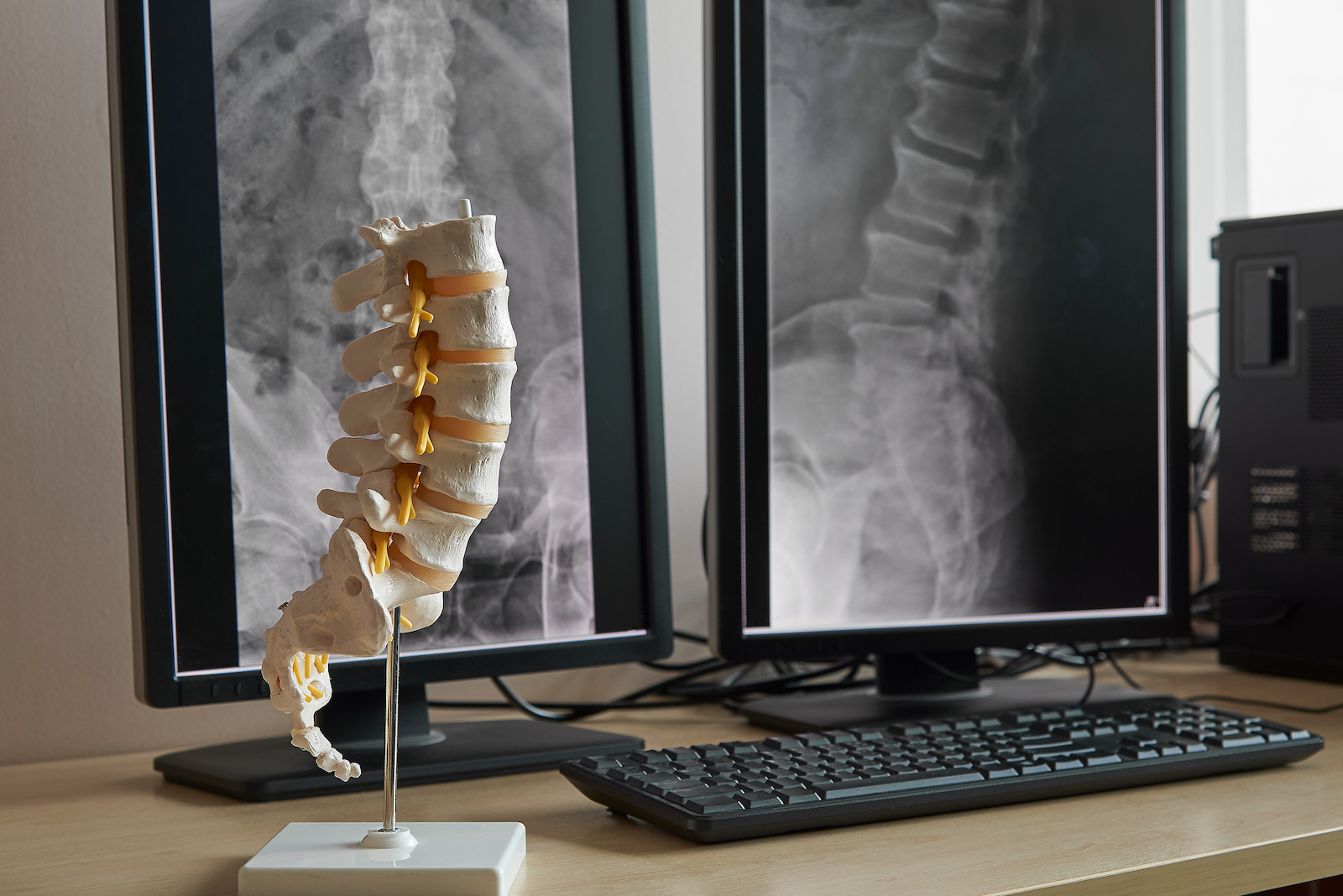
Artificial disc replacement is an operation where the surgeon removes the broken or damaged disc and replaces it with a prosthetic model. The artificial disc will stay in the patient’s body for the rest of their lives and will act similarly to the natural discs found in the spine. One question that patients often ask before surgery is what will happen if they are allergic to the artificial disc.
This is why it is critical to work with a skilled leader in spinal neurosurgery, like Dr. Todd Lanman, who has the depth of experience necessary to ensure they are optimizing the chances of preventing complications like an allergic reaction before the operation ever starts. Learn more about the rare complication of disc replacement allergies and how a skilled and experienced surgeon can help mitigate this risk.
Can you be allergic to a disc replacement?
Allergic reactions are rare in artificial disc replacement; however, you can be allergic to the prosthetic materials used in this operation. Prosthetics are made of multiple types of materials and it is important that your doctor evaluate all available options to find an artificial disc that your body will accept.
Prosthesis-Related Concerns
There are multiple types of artificial discs that are designed to accommodate different patients. Your doctor may recommend a prosthetic that is made out of nickel, polyethylene, stainless steel, titanium, or cobalt chrome. Each of these materials is chosen because it has a history of performing well when used in prosthetic devices. This is why allergic reactions to medical implants like artificial discs are so rare.
Understanding Allergic Reactions in Disc Replacement
Allergic reactions occur when your body’s immune system recognizes the implant as a foreign body and a potential threat to your health. The side effects you experience from the allergy are your immune system’s way of trying to fight the implant. Not only are allergic reactions uncomfortable, but they can cause the body to reject the prosthesis entirely causing increased pain.
Prevalence of Allergic Reactions
An estimated 10% to 15% of the American population has some sort of metal allergy or sensitivity. However, allergic reactions to artificial disc implants are incredibly rare. There are only a few documented cases of severe allergic reactions occurring after surgery, at least one of which required the patient to have the prosthesis removed.
An estimated 10% of Americans will receive a medical implant of some sort in their lifetimes. Because of this prevalence, doctors strive to pair patients with prosthetics that they will not have negative reactions to. This accounts for the low rate of allergic responses.
Symptoms and Diagnostic Methods
Excessive inflammation is one of the most common responses when the body is having an allergic reaction to an implant. The location of the implant might be swollen, sensitive, and hot to the touch. The patient might also develop a fever as the body tries to fight the foreign item inside it.
Patients are usually aware of their metal sensitivity before they need an artificial disc replacement operation. Some doctors will still test for allergies to prevent reactions from occurring after the procedure. This further reduces the prevalence of allergic reactions due to a prosthesis.
What are the symptoms of your body rejecting disc replacements? How common is this?
Along with symptoms of inflammation, fever, and chills, your body might not heal as quickly as expected if your body is struggling to accept the artificial disc. You may experience high pain levels or changes in the pain from what you’re used to. Doctors often schedule multiple follow-up appointments following an artificial disc replacement to make sure patients are healing on schedule and catch any rejections of the artificial discs before they become severe.
Types of Prosthetic Materials and Allergic Risks
Your surgeon wants to make sure that your body will accept whatever prosthesis they choose, but might not request a full allergy test before an operation because they are mainly focused on the materials used in spinal disc replacement. Here are a few common materials used in spinal disc implants.
Metal Alloys
Artificial discs are most commonly made of metal alloys, which incorporate different materials to create supportive structures. One element frequently found in these alloys is nickel, which is also one of the most common metal allergens that people have.
The development of metal alloy-based implants highlights why allergy testing is so important. If your doctor understands what you’re allergic to, they can select an implant that does not contain that specific metal.
Polymeric Materials
Researchers are also investing in polymeric materials that have high levels of biocompatibility. This means they are less likely to be rejected by the patient or cause allergic reactions. These are often preferred over metal and ceramic options.
Ceramic Materials
Ceramic also has a high biocompatibility rate and lower allergic response rate. Spinal implant developers are increasingly investing in ceramics or developing multi-material prosthetics that use a mixture of ceramic and plastic to mimic the human body’s spinal discs.
Hybrid Materials
In the same way that developers are using a mixture of ceramic and plastic materials, more artificial spinal disc manufacturers are using multiple types of materials to create their products. The goal is to design spinal discs that will not cause allergic reactions while also developing the best possible implants for patients.
Mitigating Allergic Reactions in Disc Replacement
Doctors understand that artificial disc replacement is a significant operation for patients that can have life-changing effects for the better. They take their role as your surgeon seriously and want to take every possible step to make sure the procedure will be successful. This is why experienced doctors implement allergy testing procedures before the operation and schedule multiple follow-up appointments following the disc replacement.
Pre-Surgical Testing and Assessment
Leaders in the field of spinal surgery recommend testing every patient for metal allergies or sensitivities before choosing implants for them. Some patients might be aware of their metal allergies, but others might not realize they are sensitive to certain materials. It is better to run an allergy test and discover an unexpected sensitivity than to move forward with the disc replacement procedure and have the patient’s body reject the implant.
How do you test for an impact or metal allergy?
Doctors often identify allergies through patch testing. With this practice, the medical team places small patches with potential allergens on your skin. They will then check to see which patches your body reacts negatively to. Your doctor may ask you to get a patch test for common prosthesis metals to see if you react to any of them.
I prefer blood testing on all my patients as it is much more accurate. I use orthopedic analysis panel 2 looking at metals, particles and polymers.
Advancements in Material Technology
Researchers continue to invest in artificial disc development as this operation proves to provide better results for more patients than spinal fusion. Medical implant manufacturers want to create artificial discs that better replicate the current ones in the human body. They are also investing in a variety of materials to reduce the prevalence of allergic reactions and make the prosthesis more convenient. For example, more developers are investing in plastic artificial discs to accommodate patients with metal sensitivities.
As more prosthetics hit the market and are approved by the Food and Drug Administration, patients will have more options for their implants. Doctors can choose the best possible spinal discs for their patients, reducing their chances of implant rejection.
Consult with Dr. Todd Lanman About Disc Replacement Surgery
Dr. Todd H. Lanman, an award-winning spinal neurosurgeon and founder of the Advanced Disc Replacement Spinal Restoration Center, implements allergy testing and in-depth patient consultations into his treatment process. He knows that a simple allergy test can detect sensitivities that patients might not even know they have. Through careful planning and detailed treatment processes, Dr. Lanman increases the chances that his patients have successful disc replacement operations.
While Dr. Lanman’s attention to detail and skill as a spinal neurosurgeon contribute to his success rates, more patients can get the treatment they need because of the increased development of artificial discs. There are already multiple artificial disc options that come in a variety of materials, allowing doctors to accommodate patients with metal sensitivities. More devices are likely to be approved in the future as researchers continue to develop artificial discs that support patients.
Don’t let a metal allergy or other sensitivity prevent you from treating your back pain. Dr. Lanman can develop a treatment plan that suits your needs and find prosthetic options your body is more likely to accept. Request a consultation today and take the first steps toward healing.
FAQs
Can your body reject an artificial disc replacement?
Yes. It is rare for a patient’s body to reject a medical implant, but it does occur. Your body might consider the artificial disc a foreign entity, which causes your immune system to fight it. If you experience severe pain and inflammation following the procedure that does not heal, it may be a sign that your body is rejecting the implant.
What part of the spine affects allergic reactions?
Any part of your spine can be affected by allergic reactions. Doctors usually test for allergies before moving forward with cervical or lumbar disc replacement. They will do their best to prevent a negative reaction in your body.
Can you be allergic to titanium in your back?
Titanium allergies are prevalent in around 0.6% of the population. While they are rare, you may have a titanium sensitivity. Your doctor should test for a titanium allergy before recommending a titanium-based spinal implant.
Are there specific guidelines or recommendations for allergy testing prior to disc replacement surgery?
It is highly recommended that doctors test patients for allergies before approving them for artificial disc replacement surgery. The patient might not recognize that they are sensitive to certain metals, which is why objective testing is important. Catching an allergen before an operation can reduce the chances of the body rejecting an implant.
Are there specific factors that may increase the risk of developing allergic reactions to prosthetic materials?
More than a quarter of American adults and children have at least one allergy, whether that is a sensitivity to food, metal, or seasonal pollen. People can develop allergies as they age and can also grow out of them. There are no specific factors that could increase or decrease your likelihood of developing an allergy to prosthetic materials.
Ready to reclaim your life? Get in touch with Dr. Lanman Today.
FOLLOW US ON SOCIAL MEDIA | @ADRSPINE





